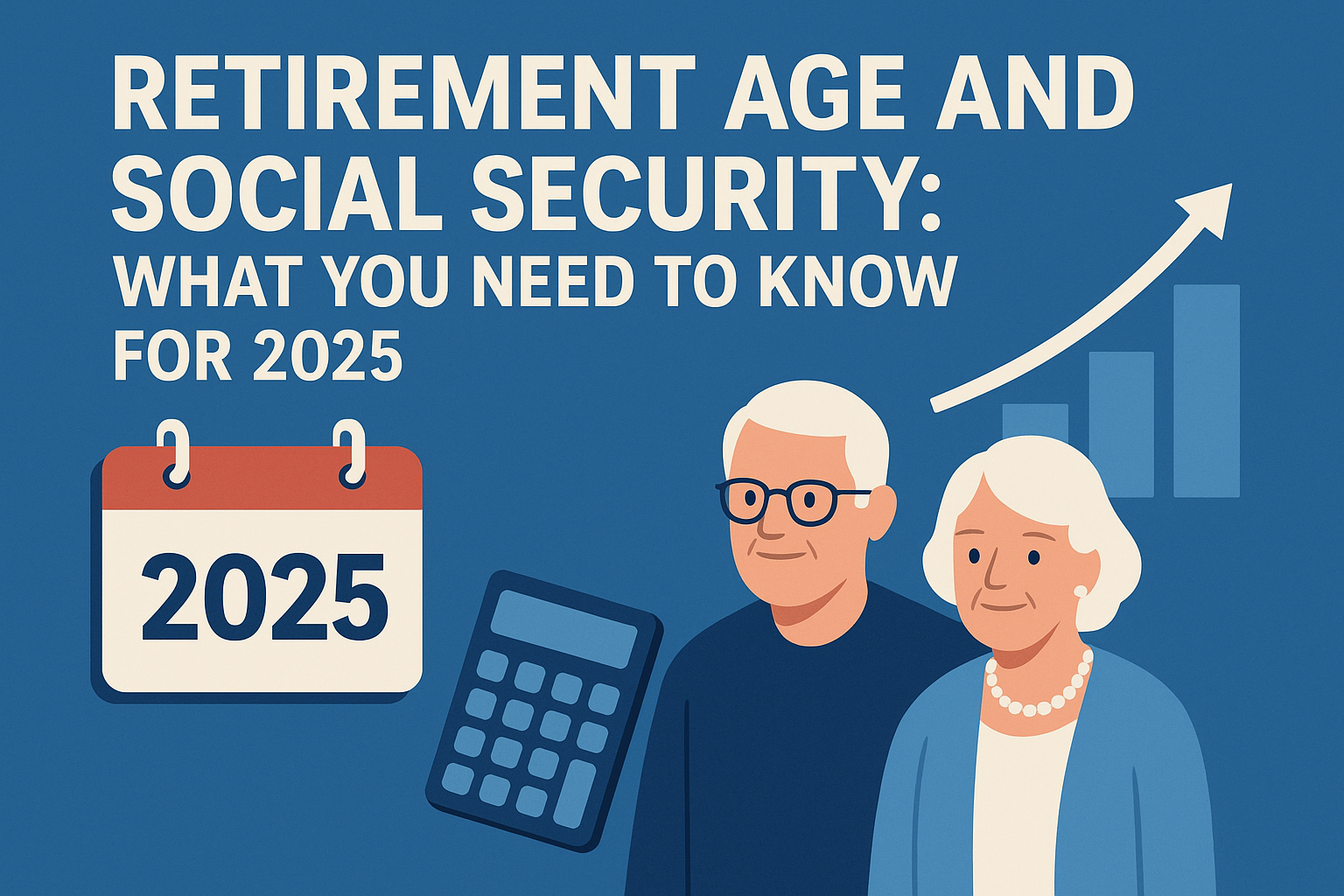Retirement Age and Social Security: What You Need to Know for 2025
Planning for retirement is one of the most important financial journeys you'll ever take. The decisions you make today—especially about your retirement age, Social Security benefits, and overall retirement plan—will shape your comfort, security, and lifestyle in your later years. With the rules and statistics around Social Security retirement age changing in 2025, it’s more important than ever to stay informed, use a retirement calculator, and craft a solid retirement plan.
Understanding Retirement Age in the U.S.
The average retirement age in the United States has gradually increased over the years. In 2025, studies show that the average retirement age is around 62for women and 64.7 for men, with most Americans considering 63 to be the “ideal” age. This is a notable shift from the early 1990s, when people commonly retired around age 57. Today, rising life expectancy and changing financial pressures mean Americans are working longer.
Here are key statistics for 2025:
- Average retirement age: 64.7 for men, 62.1 for women
- Ideal retirement age (per surveys): 63
- U.S. life expectancy: 79.1 years
- Percentage delaying retirement due to inflation: 40%
- Americans expecting to work part-time in retirement: Nearly 46%
“The situation may worsen over the next decade, as Social Security benefits are expected to be cut by as much as 20% at the same time as taxes and the retirement age to receive benefits goes up.” —Retirement study, Harbor Life Settlements
Social Security Retirement Age Is Increasing
The Social Security full retirement age (FRA) is the minimum age at which you can claim full Social Security retirement benefits. Traditionally, the FRA was65, but that changed due to longer life spans and updates by Congress. Sincethe overhaul in the 1980s, the FRA has been rising incrementally.
- In 2025, the Social Security FRA will increase to 66 years and 10 months for people born in 1959.
- For those born in 1958, the FRA is 66 years and 8 months.
- This phased increase affects when you can claim full benefits without penalty.
It’s important to understand that claiming Social Security before your FRA will reduce your monthly benefit permanently. Waiting until your full retirement age, or even up to age 70, increases your monthly payout.
Quick Reference Table: Social Security Retirement Age by Birth Year
| Birth Year | Full Retirement Age (FRA) |
| 1957 | 66 years, 6 months |
| 1958 | 66 years, 8 months |
| 1959 | 66 years, 10 months |
| 1960 or later | 67 years |
“The full retirement age is set to increase again by two months, to 66 years and 10 months old, for people born in1959. That means the higher FRA for that cohort will go into effect in 2025.” —CBS News
Why Are Retirement Ages and Social Security Changing?
Several factors are driving these changes:
- Americans are living longer. Life expectancy has climbed more than 16% since1950, and retirement funds need to last longer than ever before.
- Financial pressures. Many are delaying retirement due to inflation and inadequate savings; 40% of older Americans said inflation has led them to work longer.
- Policy adjustments: To keep Social Security funded as the population ages, Congress is gradually raising the FRA and considering benefit adjustments.
How to Calculate Your Ideal Retirement Age
Finding out when to retire—and to claim Social Security—depends on personal finances, health, and goals. That’s where a retirement calculator comes in handy. These tools help estimate how much you’ll need to save, whenyou can retire comfortably, and how factors like inflation or delayed benefit affect your plans.
Key considerations for your retirement plan:
- Desired lifestyle: How much do you want to spend each year?
- Expected expenses: Housing, healthcare, travel, and leisure.
- Income sources: Social Security, pensions, savings, investments.
- Longevity planning: Plan for 20-30 years in retirement.
Building a Strong Retirement Plan
A successful retirement plan covers more than just the numbers. It’s about making informed decisions and preparing for life’s uncertainties.
Steps to help strengthen your retirement planning:
- Consider starting early: The sooner you save, the more time your investments have to grow.
- Consider contributing to 401(k)/IRA: Take advantage of employer matches and tax benefits.
- Estimate Social Security income: Use official calculators to run different scenarios.
- Plan for healthcare: Medicare kicks in at 65, but out-of-pocket costs can be significant.
- Stay flexible: Be ready to adjust your plan if your circumstances or laws change.
Common Questions About Social Security and Retirement
1. Can I collect Social Security before my full retirement age?
Yes, but your benefits will be reduced if you start as early as 62. The reduction is permanent even after you reach FRA.
2. What happens if I keep working after claiming benefits?
If you claim before your FRA and continue working, your benefits may be temporarily reduced if your income exceeds certain thresholds. Once you reach FRA, you can work and earn as much as you like without penalty.
3. Should I wait until 70 to claim benefits?
Waiting past your FRA until age 70 increases your benefit amount each year. If you can afford it, delaying can provide a larger monthly check for life.
Expert Insight
"People often underestimate both how long they will live and how much money they will need in retirement. Careful planning and regular check-ins with your retirement calculator can make a big difference.” — Financial planner, cited in Harbor Life Settlements
Conclusion: Take Charge of Your Retirement Future
With Americans living longer and the Social Security retirement age increasing, it’s crucial to plan carefully and stay up-to-date on policy changes. Use a retirement calculator, reexamine your retirement plan, and consider both when to retire and when to claim your benefits. By understanding your options and starting your retirement planning early, you can help build a more secure, enjoyable future.
For more information and personalized calculations, consult the Social Security Administration (https://www.ssa.gov/benefits/retirement/planner/ageincrease.html) or speak to a financial advisor.
Provided content is for overview and informational purposes only and is not intended and should not be relied upon as individualized tax, legal, fiduciary, or investment advice. Investing involves risk which includes potential loss of principal. Not affiliated with or endorsed by the Social Security Administration, the Centers for Medicare & Medicaid Services, or any governmental agency. Upon clicking third-party external links, you will access content that is not controlled, reviewed or approved by, and is not the responsibility of, the entities and individuals who provided the content you are leaving.
.svg)



